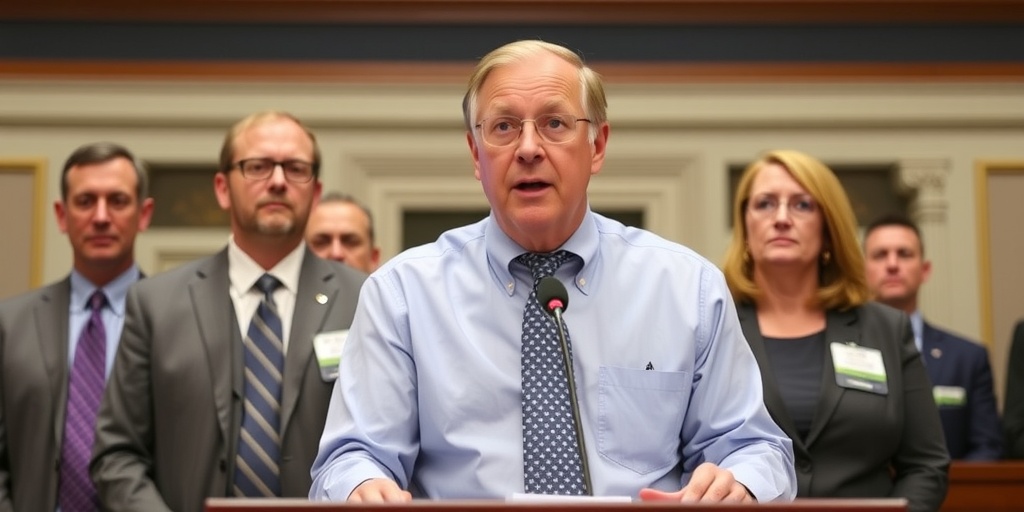Now Reading: What Is a Probationary Employee?
-
01
What Is a Probationary Employee?
What Is a Probationary Employee?

Title: Federal Layoffs Target Probationary Employees Amid Trump Administration Cuts
In the latest developments regarding the job-slicing initiatives of the Trump administration, a specific group of federal workers frequently emerges as a focal point: probationary employees. These workers, who are often less than two years into their positions, are particularly vulnerable in the current environment due to their limited job protections.
Recent reports have revealed staggering numbers regarding layoffs from various federal agencies. The Internal Revenue Service (IRS) is set to terminate approximately 6,700 probationary employees. Similarly, the Department of Health and Human Services may see a reduction of up to 5,200 positions, while the Pentagon announced plans to cut around 5,400 staff members. The Forest Service is also expected to let go of about 3,400 workers in the same category.
These probationary employees, typically with fewer than two years of service, are targeted more frequently than their nonprobationary counterparts. As a result of their status, they have considerably weaker job protections, allowing for swift dismissals that can occur with little notice or justification.
Understanding Probationary Status
Federal regulations stipulate that most civil servants will be on probation for one year after commencing their roles, while those in the "excepted" service may remain on probation for up to two years. During this probationary period, employees can be terminated at will, with managers required to only provide vague claims regarding “performance or conduct” that allegedly fails to demonstrate the employee’s fitness for continued employment. In many instances, termination notices cite inadequate performance without substantial evidence backing the claims.
While probationary employees do have the right to appeal dismissals on grounds of political bias or discrimination, their options for recourse are severely limited compared to nonprobationary staff. Once employees successfully finish their probation, they gain additional rights to appeal terminations before the Merit Systems Protection Board, requiring agencies to prove that the dismissed employee was either not completing their tasks or that the position itself was no longer deemed necessary.
The Scope of the Issue
Federal records do not explicitly label employees as being on probation, yet the Partnership for Public Service, a nonprofit focused on improving government workforce practices, estimates that around 250,000 individuals currently hold probationary status across the government. This figure constitutes roughly 11 percent of the federal civilian workforce, excluding Postal Service employees. Although the recent layoffs targeting probationers have been significant, they fall short of the estimated total currently in service, indicating that further cuts may be on the horizon.
Profile of the Affected
Demographic insights drawn from the Partnership for Public Service suggest that a substantial portion of probationary employees is relatively young, with about 27 percent under the age of 30. This age disparity presents challenges as many newly hired workers in critical fields such as cybersecurity and healthcare, particularly those recruited under the previous Biden administration, often find readily available opportunities in the private sector. Their recent dismissal can significantly impact the federal workforce that desperately needs their specialized skills.
For example, one affected employee, who wished to remain anonymous for personal safety, worked within the Federal Aviation Administration to maintain airspace charts. After receiving a termination letter just three weeks before her probation was set to conclude, she is now part of a growing list of federal employees concerned about public safety. Despite holding a master’s degree in geospatial intelligence and receiving positive evaluations along with a recent promotion, her job was rendered expendable.
Resistance from Probationary Employees
Federal employees do not intend to accept these terminations silently. Legal actions are already underway as various advocacy groups have filed a class action complaint regarding the mass layoffs with the Office of Special Counsel, an agency that protects whistleblowers. Recently, the head of this office has recommended pausing these terminations while investigations into proper procedures are conducted.
Additionally, various federal employee unions have initiated legal action against the government, seeking redress for the mass firings implemented by the White House. A federal judge has denied a temporary injunction in this case, directing further appeals to proceed through the Federal Labor Relations Authority. In another notable case, unions have sued the Office of Personnel Management for allegedly lacking the authority to enforce these firings.
As the situation continues to evolve, the fate of the hundreds of thousands of probationary employees hangs in the balance, alongside broader implications for government operations and public safety. The outcome of these lawsuits may play a pivotal role in shaping the future of federal employment practices and workers’ rights.
Stay Informed With the Latest & Most Important News
Previous Post
Next Post
-
 01New technology breakthrough has everyone talking right now
01New technology breakthrough has everyone talking right now -
 02Unbelievable life hack everyone needs to try today
02Unbelievable life hack everyone needs to try today -
 03Fascinating discovery found buried deep beneath the ocean
03Fascinating discovery found buried deep beneath the ocean -
 04Man invents genius device that solves everyday problems
04Man invents genius device that solves everyday problems -
 05Shocking discovery that changes what we know forever
05Shocking discovery that changes what we know forever -
 06Internet goes wild over celebrity’s unexpected fashion choice
06Internet goes wild over celebrity’s unexpected fashion choice -
 07Rare animal sighting stuns scientists and wildlife lovers
07Rare animal sighting stuns scientists and wildlife lovers





















